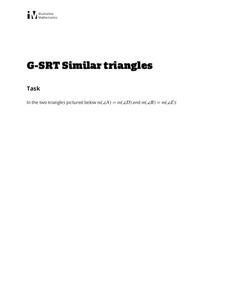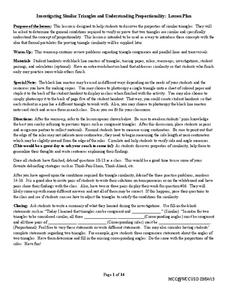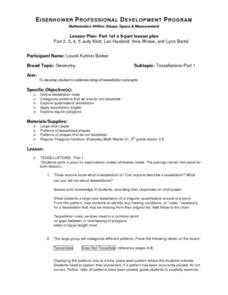EngageNY
Congruence Criteria for Triangles—ASA and SSS
How do you know if a pair of triangles are congruent? Use the lesson to help class members become comfortable identifying the congruence criteria. They begin with an exploration of ASA and SSS criteria through transformations and...
Utah Education Network (UEN)
Create, Classify, and Sort Quadrilaterals
Quadrilaterals can be quirky! Fourth graders use geoboards and bands to create four-sided figures. They analyze the attributes such as angle size and presence of parallel sides. As a result they learn to differentiate among...
West Contra Costa Unified School District
Congruent and Similar Polygons
What's similar about congruent and similar polygons? Young mathematicians first measure the side lengths and angles of given figures. They use these measurements to determine relationships between side lengths and angles of congruent and...
Curated OER
Mirror, Mirror
Geometry students use hinged mirrors to discover that the regular polygons are composed of triangles tessellating around a center point. They sketch triangles on paper models of the regular polygons having 3 to 10 sides and compute the...
Curated OER
Is This a Rectangle?
How do you show that something is a rectangle? This activity starts with four coordinate points and asks young geometers to explain whether they create a rectangle. Knowledge from both geometry and algebra come into play here, as well...
West Contra Costa Unified School District
Expository Writing in Math
Pupils engage in an activity where one partner reads directions while the other follows those directions to complete a math task (such as bisecting an angle). As a reflection, they examine products to see what information the best...
Virginia Department of Education
Inductive and Deductive Reasoning
Introduce pupils to the two types of reasoning, inductive and deductive. Classmates work in pairs or small groups to learn the difference between the two and apply these reasonings to develop valid conclusions.
S2tem Centers SC
Seasons
Winter, spring, summer, and fall—take the learning of the seasons beyond the elementary level to the middle school classroom. Curious learners begin by watching videos about the seasons and the rotation of planet Earth. Then,...
Illustrative Mathematics
Base and Height
It is easy to find the area of a triangle where the base and the height are given. But in this resource, it is up to your geometers to identify the base and height of the triangle. In fact, your pupils will learn that there are three...
Illustrative Mathematics
Similar Triangles
Proving triangles are similar is often an exercise in applying one of the many theorems young geometers memorize, like the AA similarity criteria. But proving that the criteria themselves are valid from basic principles is a great...
Teach Engineering
Windy Tunnel
Lift—it is about the wing's attack. Using a virtual wind tunnel, pupils investigate wing shape and angle of attack. Learners use worksheets to record their observations and to convert verbal relationships into mathematical equations in...
Noyce Foundation
Parallelogram
Parallelograms are pairs of triangles all the way around. Pupils measure to determine the area and perimeter of a parallelogram. They then find the area of the tirangles formed by drawing a diagonal of the parallelogram and compare their...
Curated OER
My Own Backyard
Students explore and react to the painting The Road to Santa Fe. For this interacting with art lesson, students locate various objects in the painting. Students copy the angle of objects by using their bodies. Students...
Curated OER
Unit Squares and Triangles
This is an interesting geometry problem. Given the figure, find the area of a triangle that is created by the intersecting lines. The solution requires one to use what he/she knows about coordinate geometry, as well as triangle...
West Contra Costa Unified School District
Investigating Similar Triangles
Let your use of the resource be in proportion to its usefulness. Pupils investigate similar triangles by measuring side lengths and considering given angle measures. The results of the investigation help develop generalizations about...
Curated OER
Heating and Cooling a Really Large Lizard
Remind your middle school scientists how fox ear size varies depending on the climate they live in; large ears allow heat loss while small ears keep heat in. Discuss how a cold-blooded animal might try to regulate body temperature. Then...
Curated OER
Chapter 12 Worksheet - Ions, Ionic Bonding, anc Covalent Bonding
Four pages provide plenty of problem solving practice for chemistry whizzes. They answer questions and write electron configurations for ions. They use Lewis dot diagrams to display equations. Covalent bonds are explored. The last half...
Teach Engineering
Bridge Types: Tensile and Compressive Forces
Bridges rely on tension and compression to keep them standing. Pairs test this principle by constructing simple bridges and applying a force to the center. Teams use the provided worksheet to record their observations of the...
Curated OER
Learning Lesson: Moonlight Serenade
Students complete experiments as they act as the earth. They observe how different angles affect the phases of the moon seen by us. They discuss the differences in light and dark.
Curated OER
Geometry /Tessellations
Students investigate the concept of tessellations and how they are formed using angles. They categorize how different patterns do and not tessellate and separate them into two different places for assessment. The teacher draws examples...
Curated OER
Parallel, Intersecting, and Perpendicular Lines
In this geometry lines worksheet, 10th graders solve 9 different problems related to various types of lines found in geometry. They classify each pair of lines shown as either parallel, intersecting, or perpendicular lines.
Curated OER
Trapezoids
In this trapezoids worksheet, 10th graders solve 5 different problems related to trapezoids and applying the appropriate theorem. First, they define a trapezoid, including its bases, legs, and base angles. Then, students use the...
Curated OER
Pythagorean Theorem: Triangles and Their Sides
Students investigate triangles and their relationship to each other. For this geometry lesson, students solve right triangles using the properties of the Pythagorean Theorem. They differentiate between right, acute, straight and oblique...
Curated OER
Challenge: Skills and Applications Lesson 3.4
In this geometry learning exercise, students identify the missing angles formed by parallel lines and a transversal. They differentiate between parallel and perpendicular lines. There are four questions.
Other popular searches
- Special Angle Pairs
- Geometry Angle Pairs
- Smart Board Angle Pairs
- Angle Pairs Ell
- Angle Pairs in Parallel
- Geometry Using Angle Pairs
- Angle Pairs With Answer
- Geometry Angle Pairs
- Angle Pairs Homework 14.2
- Angle Pairs Homework 142
- Angle Pairs Relationships























